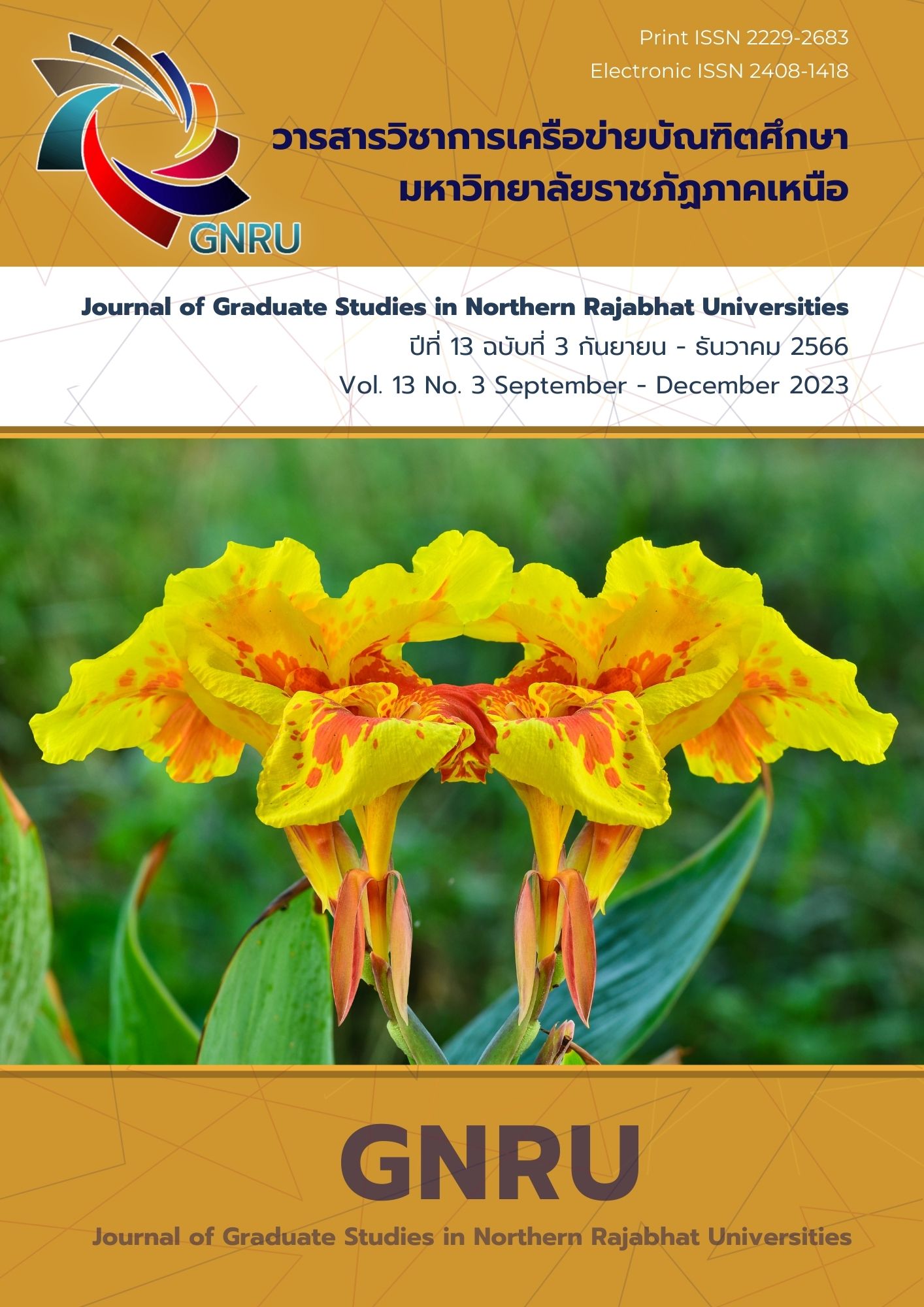1 FACTOR ANALYSIS OF TEACHERS’ COMPETENCY DEVELOPMENT FOR LEARNING MANAGEMENT INNOVATION UNDER THE OFFICE OF BASIC EDUCATION COMMISSION
Main Article Content
Abstract
The objective of this research was to investigate compositions, indicators, and competency development for the learning management innovation of teachers under the Office of The Basic Education Commission. The data collection was organized by synthesizing documents, interviewing 6 experts, and analyzing the competency components of teachers' innovative learning development. The data collection instruments included synthetic records, structured interviews, and questionnaires. They were analyzed with content analysis and exploratory component analysis. The results revealed 42 indicators in 3 components: 1) Creativity (13 indicators), 2) Learning Innovation Development (15 indicators), and 3) Learning Integration (14 indicators).
Article Details
References
A.K. Kulshrestha and Kshama Pandey. (2013). TEACHERS TRAINING AND PROFESSIONAL COMPETENCIES. Voice of Research, 1(4), 2277-7733.
Buasan, R. (2007). Direction and territory of the assessment area (2nd printing). Bangkok: V.Print.
____________. (2013). Integrated Methods for Research and Evaluation. Bangkok: Chulalongkorn University Press.
Eisner, E.W.. (1989). The Education Imagination. New York: Macmilan .
Eisner, E.W. (1975). The Perceptive Eye : Toward the Reformation of Educational Evaluation. Stanford, C.A : Stanford Evaluation Consortium.
Guba E.G. and Lincoln. Y.S. (1981). Fourth Generation Evaluation. New bury Park. California : Sage Publications.
Kanchanawasi, S.(2019). Evaluation Theory (12th printing). Bangkok: Chulalongkorn University.
Maryam Ilanlou, Maryam Zand. (2011). Professional Competencies of Teachers and the Qualitative Evaluation. International Conference on Education and Educational Psychology (ICEEPSY 2011). www.sciencedirect.com
McClelland, D. C. (1970). Test for Competency. rather than intelligence American Psychologists. Vol.17, p.7.
_______________. (1973). Testing for competence rather than Intelligence. Availble on https://www.therapiebreve.be/documents/mcclelland-1973.pdf
Miftachul Huda, Andino Maseleno, Masitah Shahrill, Kamarul Azmi Jasmi, Ismail Mustari, Bushrah Basiron. (2017). Exploring Adaptive Teaching Competencies in Big Data Era. Availble on https://online-journals.org/index.php/i-jet/article/view/6434
Nadiia Balyk, Olha Barna, Galina Shmyger Vasyl Oleksiuk. (2018). Model of Professional Retraining of Teachers Based on the Development of STEM Competencies. Availble on ceur-ws.org/vol-2104/paper_157.pdf
Office of the Basic Education Commission. (2010). Teacher competency assessment manual. (revised edition). Bangkok.
Office of the Teacher Civil Service Commission and Educational Personnel. (2005). Act on Civil Service Regulations for Teachers and Educational Personnel. 2004. Bangkok: Teachers Council Ladprao Printing House.
________________. (2021). Manual for implementing the criteria and methods for evaluating the position and academic status of teachers and educational personnel in the teaching position. According to the Office of the Teachers' Council of Thailand's letter No. STH 0206.3/W 9 dated 20 May 2021.
Pahe, S. (2018). Online education. Theory and practice. Printing House, Phrae Thai Printing Industry Limited Partnership.
Rasamithamchoti, S. (2004). Competency : An Undeniable Management Tool. Bangkok : Siriwattana Interprint Public Company Limited.
Smithikrai, C. (2009). Recruitment, selection and performance evaluation of personnel (3rd edition). Bangkok: V.Print (1991).
Stake, R. E. (1975). Program evaluation: Particularly responsive evaluation. Kalamazoo, MI: Western Michigan University Evaluation Center, Occasional Paper p5.
Taengjuang, P.(2011). Model for developing the competencies of educational personnel. Bangkok: Duangkamon Publishing.
Teacher development institute Faculty and educational personnel. (2006). Evaluating the competency of teachers and educational personnel in order to create a self-development plan (ID - PLAN) and a professional advancement plan (CAREER PLAN). Nakhon Pathom: Academic Department, Teacher Development System Development Project. and educational personnel.
Teachers Council Secretariat. (1999). Teacher Professional Standard Criteria. Bangkok: Teachers' Council of Ladprao Printing.
_______________. (2003). Teachers and Educational Personnel Council Act 2003. Bangkok: Teachers Council Ladprao Printing House.
________________. (2005). Educational Professional Standards. Bangkok: Teachers Council Ladprao Printing House.
_______________ . (2013). Laws on Educational Profession, Volume 1: National Education Act, B.E. 2542. Teachers Council of Thailand Trade Organization, Bangkok.
_______________ . (2019). Announcement of the Teachers Council of Thailand Board on the details of standards of knowledge and professional experience of teachers according to the regulations of the Teachers Council of Thailand. Regarding Professional Standards (4th Edition) B.E. 2562. (online). Source: https://www.ksp.or.th/ksp2018/2020/06/19628/
Worakam, P. (2018). Research and development project. MahaSarakham: Taksila Printing.
___________. (2019). Educational Research (11th edition). MahaSarakham: Taksila Printing.


